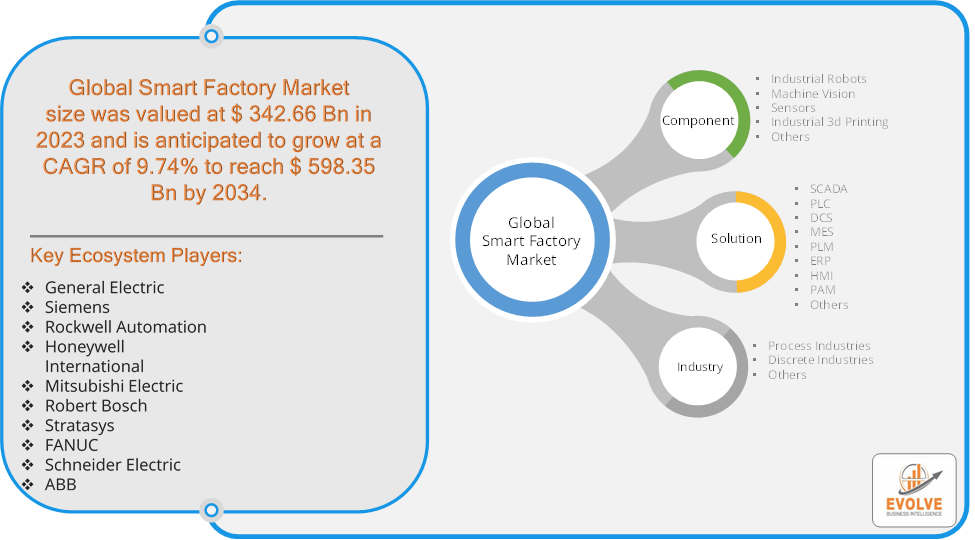Evolve Business Intelligence has published a research report on the Global Smart Factory Market, 2024–2034. The global Smart Factory Market is projected to exhibit a CAGR of around 9.74% during the forecast period of 2024 to 2034.
Evolve Business Intelligence has recognized the following companies as the key players in the global Smart Factory Market: General Electric, Siemens, Rockwell Automation, Honeywell International, Mitsubishi Electric, Robert Bosch, Stratasys, FANUC, Schneider Electric and ABB.
The Global Smart Factory Market is projected to be valued at USD 598.35 Billion by 2034, recording a CAGR of around 9.74% during the forecast period. The smart factory market refers to the global industry involved in the development, implementation, and sale of technologies and solutions that enable manufacturing facilities to become more efficient, flexible, and connected. These technologies often leverage the Internet of Things (IoT), artificial intelligence (AI), machine learning, robotics, and automation to optimize production processes and enhance overall operational efficiency.
In a smart factory, machines and systems communicate with each other, share data, and make autonomous decisions, resulting in more efficient and responsive production environments. The market is driven by the demand for greater productivity, customization, reduced downtime, and improved safety in manufacturing processes.
Download the full report now to discover market trends, opportunities, and strategies for success.
Segmental Analysis
The global Smart Factory Market has been segmented based on Component, Solution and Industry.
Based on Component, the Smart Factory Market is segmented into Industrial Robots, Machine Vision, Sensors, Industrial 3d Printing and Others. The Industrial Robots segment is anticipated to dominate the market.
Based on Solution, the global Smart Factory Market has been divided into SCADA, PLC, DCS, MES, PLM, ERP, HMI, PAM and Others. The MES segment is anticipated to dominate the market.
Based on Industry, the global Smart Factory Market has been divided into Process Industries, Discrete Industries and Others. The Process Industries segment is anticipated to dominate the market.
Regional Analysis
The Smart Factory Market is divided into five regions: North America, Europe, Asia-Pacific, South America, and the Middle East, & Africa. North America, particularly the U.S., is a major player in the Smart Factory Market due to its strong focus on automation, digitalization, and advanced manufacturing technologies. The region is home to some of the largest technology providers and manufacturing firms that are early adopters of Industry 4.0, IoT, AI, and robotics in manufacturing and the U.S. government’s support for innovation in smart manufacturing through initiatives such as the Smart Manufacturing Leadership Coalition (SMLC) and other funding programs promotes growth in this region. Europe, especially countries like Germany, France, and the U.K., has been at the forefront of the Industry 4.0 revolution, with a strong focus on industrial automation, advanced robotics, and smart manufacturing technologies. Germany’s Industrie 4.0 initiative is a key factor driving smart factory adoption across Europe. The Asia-Pacific region, led by China, Japan, South Korea, and India, is experiencing rapid growth in smart factory adoption due to ongoing industrialization, rising demand for automation, and government initiatives promoting smart manufacturing. China’s Made in China 2025 initiative and Japan’s focus on robotics and automation are key growth drivers. Latin America is gradually adopting smart factory solutions, driven by the need to enhance operational efficiency and competitiveness in industries such as automotive, consumer goods, and food & beverage and Brazil and Mexico are key markets within the region due to increasing investments in automation and digitalization, as well as their strong industrial base. Government initiatives promoting industrial modernization and foreign investments also support growth in this region. The Middle East, particularly Saudi Arabia and the UAE, is investing heavily in industrial automation and smart manufacturing as part of their broader economic diversification efforts. The focus is on reducing reliance on oil revenues and promoting industrial innovation.

